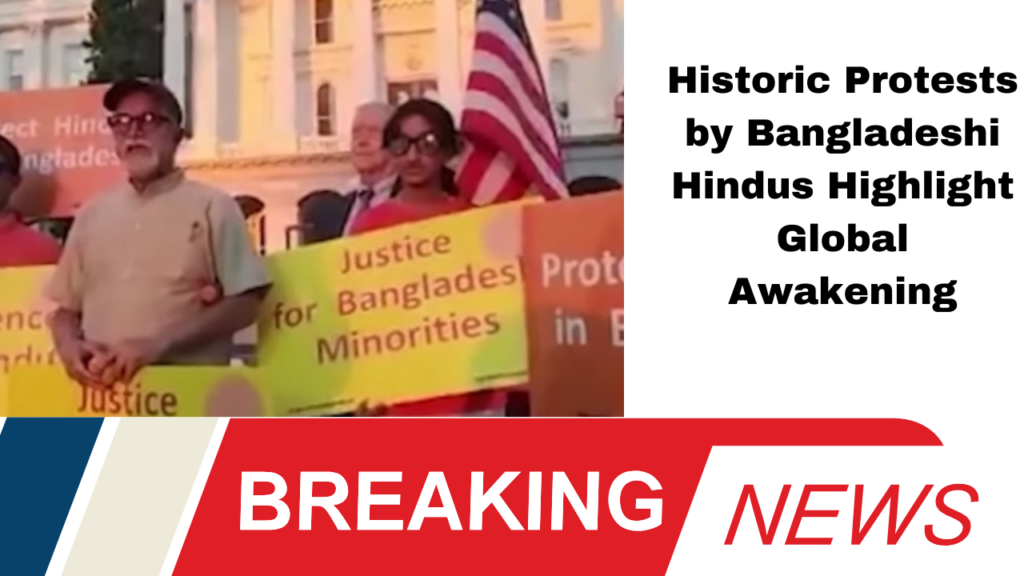Unprecedented Demonstrations Amid Political Turmoil Recent events in Bangladesh have seen an unprecedented level of activism from the Hindu minority community. For the first time, Bangladeshi Hindus have taken to the streets in large numbers, demanding protection and recognition of their rights amid escalating violence. This significant shift in their approach comes after a coup against Sheikh Hasina’s government, which has been followed by violent protests targeting Hindus.
Global Response and Call for Action
The courage displayed by Bangladeshi Hindus has resonated globally, prompting peaceful demonstrations in numerous cities worldwide, including at the United Nations Headquarters. This mobilization of the global Hindu community signifies a notable change, as Hindus are typically less vocal about their plight on the international stage compared to other minority groups. The global protests have successfully highlighted the issues faced by Hindus, leading to promises of protection from Bangladesh’s interim government. Indian Prime Minister Narendra Modi also called for the protection of Hindus in his message to the interim Chief Advisor of Bangladesh, Mohammad Yunus.
Historical Context of Hindu Victimization
The current crisis is deeply rooted in a history of persecution and marginalization. In Bangladesh, the Hindu community has been a frequent victim of violence and discrimination, particularly during political upheavals. During the 1971 war for independence from Pakistan, Hindus were disproportionately affected, with widespread killings and rapes. Many Hindus fled to India, and despite the formation of Bangladesh, the situation for Hindus has remained precarious. They continue to face violence and displacement, with many seeking refuge in India.
In Pakistan, the situation for Hindus is similarly dire, with frequent reports of forced conversions, attacks on temples, and vandalism. These conditions have driven some Hindus to migrate to India, though it is not feasible for everyone. The ongoing persecution underscores the need for robust international support and intervention.
Emergence of Global Hindu Unity
The scale and unity of the recent protests in Bangladesh are remarkable. Traditionally, Hindus have been seen as politically fragmented and less inclined to unite over global issues. However, the recent demonstrations challenge this stereotype, revealing a new level of global Hindu consciousness. Hindus in various countries, including the United States, Canada, and the United Kingdom, have expressed solidarity with their Bangladeshi counterparts, marking a significant shift towards collective action and global advocacy.
Political Implications and Local Impact
In India, the political response to the violence against Bangladeshi Hindus has been complex. Opposition parties have begun to speak out against the atrocities, though their responses are often influenced by domestic political considerations. The violence in Bangladesh includes incidents of arson, looting, and direct attacks on Hindu individuals and properties. Reports indicate that since the coup, there have been at least 205 attacks on Hindus across 52 districts.
Voices from the Ground
The situation on the ground is dire for many Hindu families. For instance, Gopal Rajbongshi, who owns a pharmacy in Dhaka, faced severe violence after the coup. His shop was looted, and he was forced into hiding with his family due to threats from rioters. Rajbongshi’s experience reflects the broader struggles faced by the Hindu minority in Bangladesh, who are dealing with both physical attacks and psychological trauma.
The recent protests by Bangladeshi Hindus and the international response they have generated underscore a growing global awareness of their plight. This increased visibility and solidarity are crucial in addressing the issues faced by Hindu communities in Bangladesh and beyond. As the situation evolves, continued global support and advocacy will be vital in ensuring the protection and rights of minority communities facing persecution.
